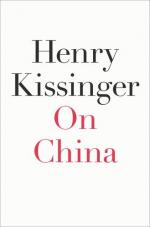
|
| Name: _________________________ | Period: ___________________ |
This test consists of 15 multiple choice questions and 5 short answer questions.
Multiple Choice Questions
1. China often referred to itself as the "Most ____ Nation."
(a) Competent.
(b) Feared.
(c) Revered.
(d) Favored.
2. Who was China's leader at the time?
(a) Chiang Kai-Shek.
(b) Mao Zedong.
(c) Ma Ying-Jeou.
(d) Lin Sen.
3. The treaty allowed a permanent ____ to be established in Beijing.
(a) U.S. presence.
(b) Military base.
(c) Leader.
(d) Embassy.
4. The Chinese learned to play the ____ off one another.
(a) Politicians.
(b) Infiltrators.
(c) Barbarians.
(d) Opposition.
5. During which period did the decline take place?
(a) Three Kingdoms.
(b) Imperial War.
(c) Ming Dynasty.
(d) Chang Dynasty.
6. Which method is used to translate Chinese close to the Roman alphabet?
(a) Confucian.
(b) Anglo-Roman.
(c) Pinyin.
(d) Wade-Giles.
7. Count _____ Ignatieff served as the Czar's brilliant and devious young plenipotentiary.
(a) Nikolai.
(b) Boris.
(c) Igor.
(d) Petrov.
8. In what year did Zheng He's expeditions stop abruptly?
(a) 1529.
(b) 1473.
(c) 1433.
(d) 1381.
9. Traditionally, China did not on technology or military power but relied upon two of its most deeply traditional resources: the analytical abilities of its diplomats, and the endurance and ____________ of its people.
(a) Inner warriors.
(b) Strength.
(c) Cultural confidence.
(d) Gentleness.
10. China is referred to as being a ____ society.
(a) Patriarchal.
(b) Socialist.
(c) Matriarchal.
(d) Libertarian.
11. In the early years China often exchanged good with which country?
(a) India.
(b) Britain.
(c) Turkey.
(d) Japan.
12. In what year did the French Jesuit Jean-Baptiste Du Halde write about China?
(a) 1793.
(b) 1911.
(c) 1736.
(d) 1804.
13. In what year B.C. did the Chinese unification take place?
(a) 492.
(b) 109.
(c) 304.
(d) 221.
14. Which is not one of the nomadic groups mentioned?
(a) Uighurs.
(b) Tibetans.
(c) Mongols.
(d) Turks.
15. Which major Chinese city was first visited by Kissinger?
(a) Beijing.
(b) Hong Kong,
(c) Shanghai.
(d) Wuhan.
Short Answer Questions
1. In 1859, Frederick ____ arrived in Beijing.
2. By 1860, the Russians had been in Beijing for ____ years.
3. China has produced a greater share of total world GDP than any Western civilization in ____ of the last 20 centuries.
4. A new gap in authority began to appear after the occurrence of the Qiying-_______ negotiations.
5. Kissinger compares the unification to which European treaty in 1648?
|
This section contains 307 words (approx. 2 pages at 300 words per page) |

|




